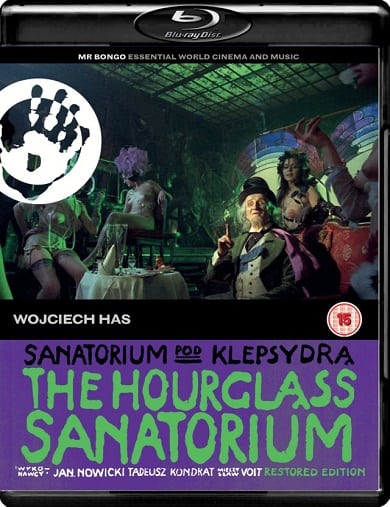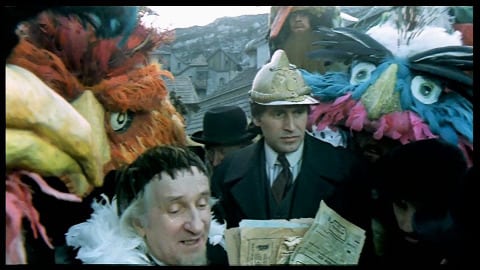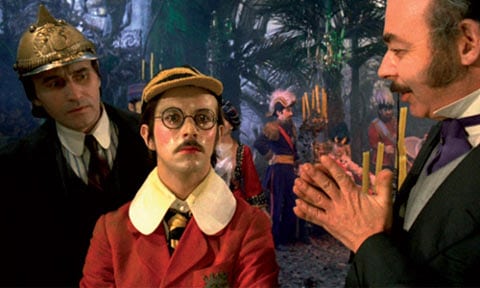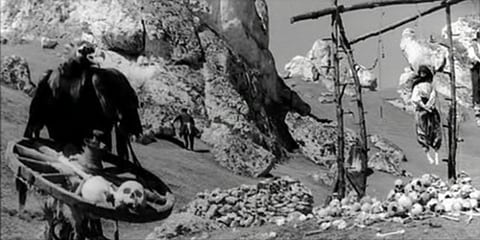The Hourglass Sanatorium (1973)
Directed by: Wojciech Has
Written by: Bruno Schulz, Wojciech Has
Starring: Halina Kowalska, Irena Orska, Jan Nowicki, Tadeusz Kondrat
Poland
AKA SANATORIUM POD KLEPSYDRA, THE SANDGLASS
ON BLU-RAY: 7TH SEPTEMBER, from MR BONGO
RUNNING TIME:119 min
REVIEWD BY: Dr Lenera, Official HCF Critic
Joseph journeys on a dilapidated train to visit his dying father in a sanatorium. When he arrives there, from the outside it looks like nobody lives there and he struggles to get into the place. Inside, it is very ruined and no one seems to be in charge or even caring for the patients. A doctor does eventually appear, but tells him that time exists differently there and that his dying father is dead in Joseph’s world but alive and may even recover in the sanatorium. Joseph explores the place and begins to experience a flood of dreamlike visions of his past, in particular the small Jewish town he was raised in….
I think that you can only be sure that you really like a filmmaker when you’ve seen two of his or her films. The first one could be a fluke, the one film that you may find to be any good, and certain films can only work well in certain circumstances. However, with the second picture, you’re on much firmer ground. Wojciech Has’ 1965 film The Saragossa Manuscript was quite an extraordinary viewing experience for me. There were times I felt lost, even times where I wasn’t sure if I was enjoying it, but I never lost my fascination for the film. I guess with The Hourglass Sanitorium I had more of an idea of what to expect and could more easily get myself on something close to the same wavelength on which this crazy filmmaker was working on, but I found it to be an even more fulfilling watch than the former film and had certain flashbacks to when I was a teenager and first discovered the work of directors like David Lynch and Alexandro Jodorowsky for the first time, becoming aware of a whole kind of daring, totally unrestricted cinema that existed beyond the acres of blockbusters and pictures made for easy assimilation. If I were to describe The Hourglass Sanitorium quickly to someone I would call it Schindler’s List meets Alice In Wonderland [I know how mad and even “wrong” that sounds] though such comparisons don’t really do such a unique film justice, is a good. In any case, The Hourglass Sanitorium is amazigly surreal, confusing, even exhausting, but quite wonderful, and is also actually “about” stuff despite all the weirdness going on. This film, I was able to discern most of the overall points being made, and for me this made the weird stuff stronger, not weaker.
The film is a loose adaptation of a story collection Sanatorium Under the Sign of the Hourglass by Bruno Schulz, who was shot by the Gestapo in 1942, but also includes sequences from other works by Schulz, a writer whom Has had loved since he was a child, plus influences from Has’ own childhood and upbringing. Has worked on what was clearly a very personal project for three years, and had to contend with a very low budget, but the finished film wasn’t liked by the strict Polish authorities and banned there. Not only was the crumbled sanatorium interpreted as a parallel to the poor condition of many institutions and manor houses in contemporary Poland, but Has had also chosen to emphasize the Jewish aspects of the source material, this being soon after an anti-semitic campaign the government had launched in 1968, which had prompted around 30,000 Polish Jews to leave the country. Despite being forbidden to do this, Has smuggled the film in secret to the 1973 Cannes Film Festival, where it won the Jury Prize. Has was forbidden to make any film in Poland for the next few years.
As before, Has hurls us into the strange world of his film immediately. The opening of this one is especially striking, as we see a bird [which looks animated] flying past a back projected [not very well, but maybe we’re intended to notice the fakery?] tree and the camera pulls back to find itself inside a train carriage. A really grim atmosphere is set as the train appears to be populated by sleeping people who all appear dead, and all wearing outfits from different periods, while the conductor is blind and seems at least half dead himself. I doubt very much that I was reading too much into the film at this early stage when I was reminded of Jews going on trains to the Nazi gas chambers. As before, Has uses musical effects in a really clever and unsettling way, from a noise that sounds like something being scraped to a ghostlike wail. Eventually, Joseph reaches his destination, and it’s like the beginning of most versions of Dracula when Jonathan Harker arrives at Dracula’s Castle. From the outside the sanatorium really is forbidding, while, when Joseph opens what seem to be the main doors, it’s blocked by masonry. However, once he gets inside the place through a widow and looks outside, he sees himself open the doors again and being beckoned by a small boy down a path flanked by trees. Curiouser and curiouser, especially when it seems that time is slowed down in this place and Joseph begins to wonder through, and around, the sanatorium and encounter not only people and places from his past but rather stranger folk.
From now on you just have to “go with the flow”. If you wish for something approximating a coherent narrative and everything to make sense, then the film will just increasingly annoy you. There is obviously a sense to some of what goes on, with Joseph obviously flashing back to his youth, though he often remains of the same age even when people think he’s a child. His first flashback sees him find his mother, who berates him for “spreading lies and gossip” about his father. He later finds his father seemingly alive and well, philosophising in an attic full of birds, while there’s also a small boy with stamps who could, posssibly, be him. There are pretty women who want to sleep with him though he inexplicably turns them down. Then there are people who are wax figures but who later come alive, people in bird masks, elephants, negro soldiers, a woman who talks to him through a fence about her ghost mother who appears in the distance, and other delights. It seems that most of this is happening in and around the sanatorium, its eerie graveyard seen out the window near the beginning becoming a thriving town of the past a few scenes later, but a simple action like crawling under a bed can also transport him to another time and place. There’s also much cryptic talk which may be meaningful or not. Joseph sometimes wonders if certain things actually happened, and maybe the past is being changed by him interfering in it, or….well, it’s best not to think too much about all this and enjoy the mind-bending trip.
The whole thing moves at a rather tiring pace as Joseph alternates between the various worlds within which he finds himself, and I sometimes wished it would slow down. As in The Saragossa Manuscript, Has likes to change the tone of his film, so that one moment we can get a whole Jewish community bursting into song, and another moment we can see a woman talking quietly about the ghost of her mother who can be seen in the distance. Has has a knack for disturbing imagery, like when a wax dummy begins to sway, move his arms and fall over splitting his head open, blood oozing out. Elsewhere he provides humorous touches, though overall I found this film to be more serious than the previous one because, despite all the bizarre elements, deep down it’s about serious things; death, the passage of time and father/son relationships, not to mention the Holocaust, the film perhaps more than anything else seeming to be a lament for Poland, a country whose disintegration during World War 2 is mirrored by the way Joseph disintegrates both bodily and mentally throughout, and an Eastern European Jewish culture which was obliterated by the Nazis. Sometimes I could almost feel the pain coming from the film, and it’s right that the final scene is quiet and sad while still being, as with any great Surrealist movie, open to interpretation.
As before, the performers tend to be rather exaggerated and for me it limited the effectiveness of some scenes, while I feel the film would have benefitted from a stronger lead performance. Jan Nowicki is certainly okay, and his role must have been a hard role to pull off tonally, but he doesn’t show much emotion which slightly mutes the emotional elements of the film. I cannot believe I haven’t got around to mentioning Witold Sobocinski’s cinematography yet, because it really is striking in the way it often bathes shots in colour, especially green. A sequence with Joseph and a seemingly mad prostitute contains some pink and green lighting which is simply gorgeous to behold. Has had little money for special effects, but devices like this and sometimes employing a fisheye lens enhance the feel of a dream. Because that’s what, more than anything else, what this film is – a dream, or a collection of dreams, on celluloid. It gets closer to the essence of dreams – how they work and what they do – more than possibly any other film I’ve seen.
As before, Mr Bongo’s Blu-ray contains no special features, but does have a fine restoration of the film, again ported over from the Polish Blu-ray. The image is a little soft in some of the close-ups, but is otherwise of very high quality with excellent depth, and with no stretched folk this time!








Be the first to comment